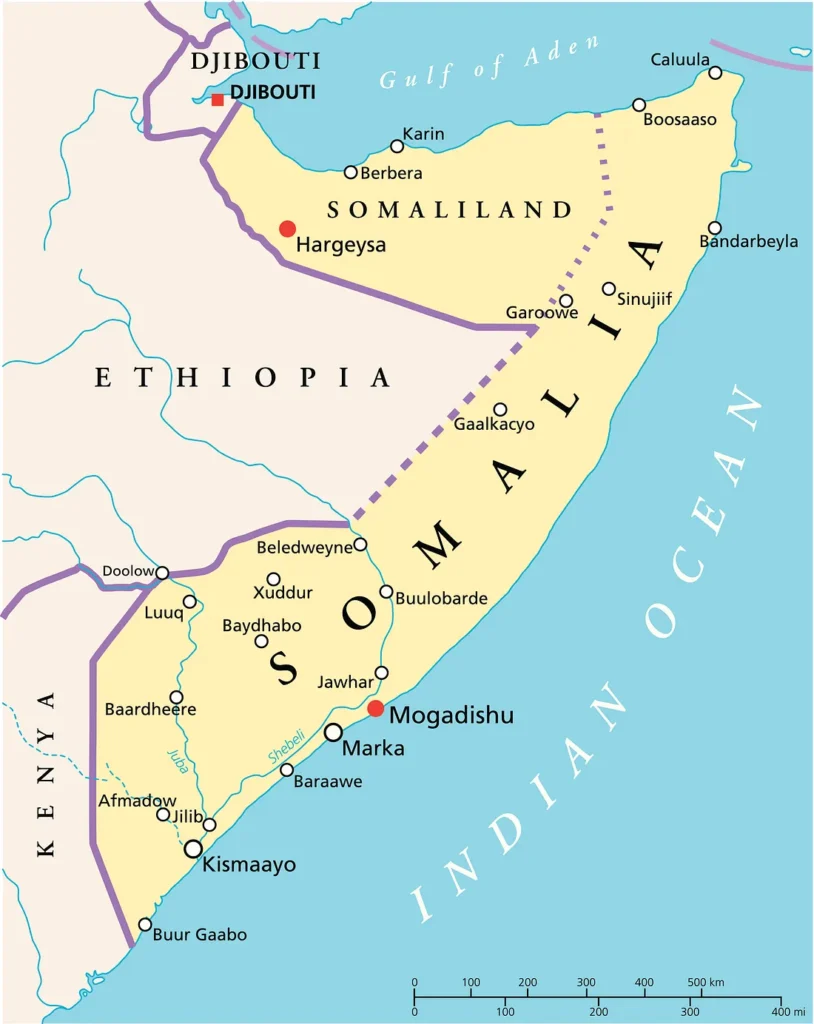#Araweelo_News_Network.
In my years as an advocate for Somaliland’s quest for recognition, I have long championed the strategic imperative of leveraging Somaliland’s unique geopolitical and economic position. The recent memorandum of understanding (MoU) between Ethiopia and Somaliland, granting Ethiopia access to the Berbera port in exchange for the promise of international recognition, represents a pivotal moment in the unrecognized state’s history. As someone who has advocated for such an agreement, the formalization of this MoU is a realization of strategies I believe are essential for Somaliland’s path toward recognition and economic development.
Examples from History:
The relationship between Taiwan and its economic partners illustrates a situation where substantial economic ties exist despite a lack of formal diplomatic recognition. Similarly, the Turkish Republic of Northern Cyprus (TRNC) has developed economic relationships despite limited recognition.
2. Ethiopia as a Patron State
Should Ethiopia extend formal recognition, it would assume a “patron state” role, akin to Turkey’s relationship with the TRNC. This scenario could bolster Somaliland’s international standing and encourage other nations to consider recognition. However, it risks isolating both Ethiopia and Somaliland from countries opposed to altering established borders.
Examples from History: The role of Russia in Abkhazia and South Ossetia demonstrates how patron states support client states’ economies and international lobbying efforts. However, this arrangement often comes at the cost of international isolation and increased regional tensions.

3. Triggering a Cascade of Recognitions
The most optimistic outcome envisions Ethiopia’s recognition setting off a domino effect, leading to wider international recognition of Somaliland. This scenario depends on Somaliland demonstrating stability, democratic governance, and the ability to contribute positively to the international community.
Examples from History: The gradual increase in the number of countries recognizing Kosovo’s independence showcases how initial recognition can lead to a broader acceptance over time. However, this path requires careful diplomacy and the alignment of interests with potential recognizing states.
The Advocacy for Recognition and the Port Agreement
My advocacy for Somaliland’s recognition has always been predicated on the belief that strategic economic and political agreements could pave the way for international legitimacy. The Ethiopia-Somaliland MoU is a testament to the power of strategic diplomacy and economic incentives in navigating the complex path to recognition. By offering Ethiopia access to the Berbera port, Somaliland has not only secured a potentially game-changing economic partnership but has also taken a bold step towards challenging the international community’s norms on state recognition.
Implications for Regional Dynamics and International Norms
Despite the optimism surrounding the Ethiopia-Somaliland memorandum of understanding (MoU), Somalia’s counter-efforts signal a brewing storm of diplomatic chess moves in the Horn of Africa. Somalia, in a bid to undercut the burgeoning partnership between Ethiopia and Somaliland, has reportedly engaged Egypt in talks, aiming to leverage the historical Nile water dispute tension between Egypt and Ethiopia. This strategic maneuver is complemented by a significant agreement with Turkey, wherein Turkey is set to exploit 30% of all potential resources off the Somalia coast. This deal not only strengthens the Somalia-Turkey alliance but also strategically positions Turkey as a major player in the regional power dynamics, potentially altering the balance of interests in the Horn of Africa.
Ethiopia, cognizant of the ramifications of Somalia’s diplomatic engagements and the potential shift in regional alliances, appears to be treading cautiously. Reports suggest that Ethiopia is considering suspending the historic port agreement with Somaliland, signaling a potential recalibration of its foreign policy strategy in light of the complex geopolitical landscape. This development underscores the intricate interplay of regional interests, where economic ambitions and strategic partnerships are continually shaped by the actions and reactions of neighboring states. The unfolding scenario highlights the fragile nature of geopolitical agreements in the region and the lengths to which states will go to protect their interests and influence the regional power structure.
The outcomes of this agreement extend beyond Somaliland and Ethiopia, posing significant questions about the future of international law, the principle of territorial integrity, and the right to self-determination. A successful implementation of the MoU could redefine regional dynamics in the Horn of Africa, potentially leading to a more stable and economically integrated region. However, the broader implications for international norms surrounding state recognition and sovereignty are profound. This agreement challenges the status quo and invites a reevaluation of the criteria for statehood and recognition in the international system.
Conclusion
The Ethiopia-Somaliland MoU represents a watershed moment in the quest for recognition of de facto states. As someone who has long advocated for leveraging Somaliland’s strategic assets to secure recognition, this development vindicates the belief in the power of pragmatic diplomacy and strategic economic partnerships. While the path forward is fraught with challenges and uncertainties, the potential outcomes of this agreement offer a glimpse into a future where economic pragmatism and strategic partnerships can redefine the boundaries of statehood and international recognition. The journey of Somaliland, from a brief moment of independence to its current quest for recognition, underscores the evolving nature of international relations and the enduring quest for self-determination.
By Paulo Santos, Horn of Africa Analyst
Horn Daily




